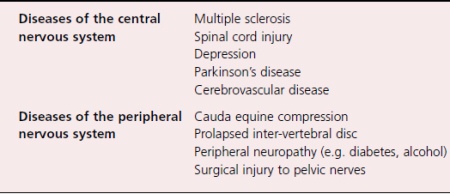Neurogenic erectile dysfunction
Diseases of both the central and the peripheral nervous system can result in erectile dysfunction. Again, there are too many to allow much detailed discussion and a list of the commoner neurogenic causes of ED.
Several psychiatric conditions, such as depression, can result in ED, and they are more usefully considered as organic causes rather than psychogenic. In fact, the relationship between depression and ED is a complex one. Depression can certainly result in ED, but mild depression can also result from ED, such that it has become clear that treatment of ED in men with mild depression can improve the depressive symptoms as well as the ED. A further issue is the sexual effect of the drugs used to treat depression (see later).
Spinal cord injury affects erectile function, but the picture depends upon the level and extent of the injury. Broadly speaking, men with high lesions can still get reflex erections (via intact reflex pathways) while men with low cord lesions can sometimes continue to get psychogenic erections (via intact sympathetic pathways).
Other issues that are relevant in men with neurological disease are the effects of the disease upon mobility, manual dexterity and urinary function. Disorders of one or all of these systems might also exacerbate any erectile dysfunction. Nowhere is this seen more clearly than in multiple sclerosis, where quite severe disability can be seen in young men who might have relatively normal sexual function. Furthermore, even if erectile function has been lost, but can be restored by treatment, other disabilities might preclude sexual activity.
Endocrine mechanisms of erectile dysfunction
Testosterone is central to normal male sexual function having an important role in both sexual drive and penile erection. However, a reduced level of testosterone has variable effects upon sexual function. There is reduction in libido, but a less marked effect upon erectile function. Men who are hypogonadal do not necessarily lose psychogenic and reflex erections. They do, however, have diminished nocturnal erectile activity, with both reduced duration and rigidity of the erection.
Again, there is a large number of causes of reduced serum testosterone, but they can be broadly classified into primary hypogonadism (where the disease is testicular) and hypogonadatrophic hypogonadism, where the primary disease affects the pituitary or the hypothalamus.
- Examples of the former are the hypogonadism which may follow mumps orchitis, or that which follows radiotherapy to the testes.
- Examples of the latter include congenital causes such as Kalmann’s syndrome and acquired causes such as pituitary tumours.
A rare endocrine cause of ED is a prolactin secreting tumour of the pituitary. The presenting symptoms are typically ED, galactorrhea and gynaecomastia.
The serum testosterone is usually reduced and the diagnosis is made by CT scanning of the pituitary.
